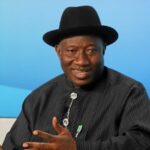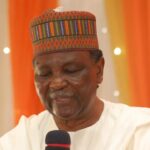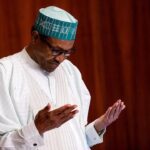Several issues came to my mind yesterday when I read the Daily Trust on Sunday story titled Buhari’s Hidden Ministers.
The story listed several ministers that it said have been almost invisible since they were appointed into the Federal cabinet last year. Most of the men and women mentioned in the story are Ministers of State. The first thing that comes to mind is, how can a Minister of State be visible when the senior Minister must have cornered all the juicy ministerial goodies including the control of money, contracts, appointments, control of agencies under the ministry’s supervision and, most crucially, access to the President or at least to the President’s Chief of Staff?
Some of the ministers mentioned in the story were highly visible public officers before they became ministers. Mrs. Sharon Ikeazor was very visible as Executive Secretary of the Pension Transitional Arrangement Directorate, PTAD. In that role she was in the news nearly every day, supervising the once endless verification of pensioners, clearing huge backlogs of pensions and bringing into the payroll ex-staffers of privatized federal agencies that were completely forgotten for decades. Why she is now invisible as Minister of State for Environment, is a mystery. Not that the senior Minister Mohammed Mahmud is very visible, at least compared to his predecessor Mrs. Amina Mohammed.
Minister of Special Duties and Intergovernmental Affairs George Akume was also listed as invisible, until he broke cover last Wednesday and reeled out what he said were his ministry’s achievements. Akume has no reason to be invisible. He was a two-term governor of Benue State, a senator, in fact Senate Minority Leader. He must be used to visibility. In his current portfolio, Akume said he is in charge of federal intervention projects in the states, of coordinating international assistance projects as well as supervising National Assembly members’ constituency projects. Each of these three sectors has numerous projects, at least on government vouchers, so why is Akume not seen running all over the place to inspect them? Is it because many of the projects exist only in vouchers?
Generally speaking, ministerial visibility has a correlation with portfolio. Some ministries are much larger than others, with a lot more staffers, with offices all over the country, with budgets the size of many state governments’ or more, and with many juicy agencies under their wings. Still, the Daily Trust on Sunday story counted the Minister of Defence, Major General Bashir Salihi Magashi and the Minister of Police Affairs, Muhammadu Maigari Dingyadi, as almost invisible. Dingyadi’s ministry, which was excised from Interior Ministry, has always been bureaucratically problematic. It is supposed to have Nigeria Police Force under its wing but in practice this is hardly so. Which control can the minister exercise over the Inspector General who is frequently seen on television attending numerous [some say ineffectual] National Security Council meetings with the President, standing shoulder to shoulder with military service chiefs and intelligence agency chiefs?
The Defence Minister’s invisibility is more surprising. Defence is one of the largest and richest of all ministerial portfolios, with three huge military branches under its wing and with at least one military garrison is every state. Magashi is not new to the portfolio, since he is a retired Army General, or to visibility, since he was once a Military Governor. Besides, we are in the midst of a war, a situation that can thrust even obscure figures into the limelight. When the Falklands War between Britain and Argentina broke out in 1982, everybody in the world soon heard of Brigadier General Basilio Lami Dozo, Chief of the Argentine Air Force. His visibility increased tenfold when he announced that his Super Etendard planes had sank the British warship Sheffield with Exocet ship-killing missiles.
Other situations, the equivalent of war, thrust other ministers into the limelight whether they like it or not. The pandemic forced Minister of Health Ehanire to assume a larger than life role, daily appearing in the news to give briefings. It was the most challenging situation that a Health Minister found himself in since 2014 when “that madman Sawyer,” to quote President Jonathan, imported Ebola into Nigeria. Then Health Minister Professor Onyebuchi Chukwu responded forcefully and very effectively to the scourge. Probably the most visible Health Minister in Nigeria’s history was Prof Olukoye Ransome-Kuti during the Babangida era. His was a combination of visibility and extreme effectiveness; he made EPI and ORT top on the national agenda and saved millions of young Nigerian lives.
Ehanire’s role as the COVID pandemic fighter-in-chief was later outshined [if that was it] by the Presidential Task Force chaired by SGF Boss Mustapha. The SGF is not normally as visible as ministers, since his work mostly involves shuffling around of presidential papers. The pandemic however made this SGF to appear on telly nearly every day, dishing out distressing figures of infections, goading citizens to distance themselves from one another, something most Nigerians cannot afford to do, and forcing us to wear face masks like so many secret cultists. It is a mark of how Mustapha and his team have changed the national scene that whereas only last year, one could get shot for trying to enter a bank with a mask, these days you cannot enter a bank without one.
While ministerial visibility has some correlation with size and importance of portfolio, there is also a personal element to it. Some ministers who are manning huge ministries do not enjoy publicity commensurate with their portfolios. A minister may also be less visible than another who once held the same office. Of course it has something to do with antecedents. There are 9 former civilian and military governors in President Buhari’s cabinet, men who were already household names before they became ministers. Such men and women attract publicity more easily than a previously unknown minister.
Some people love publicity more than other people. Some people are camera shy and they squint and squirm when they see TV crews adjusting their lenses. Some public officers would rather die than wake up in the morning and not see their names mentioned in the news, good or bad. At least one VIP once told me that he detests a life without controversy. I heard another politician say that every publicity is good publicity, that it is better to feature in a negative story than to go without mention for long.
The most important question however is, is visibility the same thing as effectiveness and performance? Certainly not, except that invisibility for a public officer often conveys to the public the impression of non-performance. Our experience in Nigeria has shown that some of the loudest ministers, and governors as well, are the proverbial empty barrels that make the most noise. There was a state governor whose aides privately whispered that he was addicted to the microphone. Whenever he came across one, he went on talking endlessly, saying very little of substance.
On the other hand, there are public officers who believe, often in an exaggerated fashion, that action speaks louder than words. In the long run one’s performance in office is the most important thing but even that wonderful performance should better be accompanied by adroit publicity. The country is so large and people are so busy that unless you make out time to tell them, they may never know that you did something, unless it is a road that they can ply or a water works that pumps water to their homes. Most other achievements are not noticed by the public unless they are told. No wonder that Sir Ahmadu Bello said if you don’t blow your own trumpet, nobody will blow it for you because others are too busy blowing their own!
In many spheres of life it is rewarding to lie low, but not in public life. Visibility is the maggi that seasons a public officer’s career. It is what makes heads to turn as soon as you walk into a hall. It may or may not translate into votes.

 Join Daily Trust WhatsApp Community For Quick Access To News and Happenings Around You.
Join Daily Trust WhatsApp Community For Quick Access To News and Happenings Around You.


